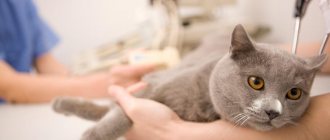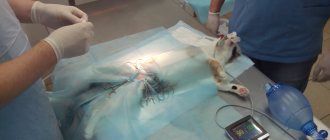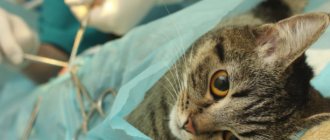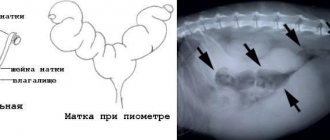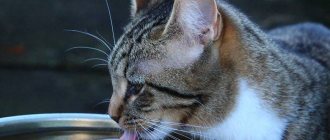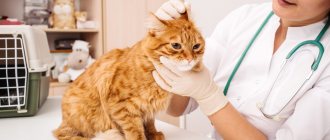Castration of older cats
It is very important to perform castration in a timely manner so that this procedure does not have negative consequences for the cat’s health and at the same time maintains its effectiveness. A pet is considered ready for such a serious operation if it meets two basic conditions:
- The cat has recently reached puberty. Veterinarians advise castrating those cats that have not yet participated in mating. Otherwise, even the removal of some reproductive organs will not lead to the desired result: the pet will still be focused on finding a female;
- the cat’s body has completed its physiological development, in other words, your pet has finally formed. Since castration radically changes metabolic processes in the body, it negatively affects young cats that have not had time to grow up, further slowing down the development of the animal.
Only those cats whose bodies have had time to form are subject to castration.
If we talk about more specific time frames, then the earliest age at which castration can already be carried out is six months. The boundaries of the latest age are blurred. Some owners castrate their pets at 2, 3, and even 4 years old, but veterinarians advise this operation to be performed on cats up to a year old.
It should also be kept in mind that different breeds require different rates of development. Representatives of large breeds experience anesthesia more easily due to their greater weight (castration is carried out on pets that have reached a minimum body weight of two kilograms). However, the lower threshold of six months does not mean that as soon as your cat is six months old, he should immediately be taken to the vet for surgery.
In different breeds, the onset of physiological and sexual maturity may occur at different times.
The best solution when choosing the appropriate age for castration would be to prefer the golden mean, which involves removing the gonads in animals between the ages of 8 and 10 months. It is at this time that cats complete the formation of all anatomical structures, and their health is sufficiently strengthened to tolerate anesthesia well.
The veterinarian himself can suggest the appropriate age for castration when examining the animal. The fact is that, in addition to age criteria, there is also anatomical criteria. A signal that the pet is ready for castration is the prolapse of the testes, which can occur at different times in different individuals.
Before performing the operation, the veterinarian always assesses the cat’s readiness for castration.
Until descent, the testes are located either in the abdominal cavity or in the inguinal ring. This means that even with the strong desire of the owners, the veterinarian simply will not be able to perform surgical intervention. However, a feature of cat physiology is that puberty in these animals precedes the actual physiological one.
The issue of castration is considered especially acute during the mating season, when the cat begins to tear up furniture and carpets and meow. Veterinarians advise castrating a cat before one year of age, but you can castrate an older cat. The optimal age for castration is considered to be from 6 to 12 months. It is at this time that the cat’s body is ready for such an operation, while puberty has not yet been completed. Consequently, at this time, hormones are produced only in the testicles, which makes it possible to stop their production by castration.
After a year, hormones begin to be produced in the pituitary gland, especially after mating with a cat, so castration may not get rid of all problems. You can castrate a cat at 6 months, when he has already gained the necessary weight, but puberty has not yet ended.
Old age in cats begins at seven years of age; at this age, cats are usually castrated only for medical reasons. Veterinarians do not recommend castrating old animals without serious reasons, because they may not survive the operation, and there is also a high risk of complications. Typically, this operation is performed on pets over seven years of age due to the occurrence of aggression, urinary incontinence, and diseases of the testes.
If castration is necessary, you should be well prepared for this. It is necessary to take urine and blood tests, do a chest x-ray, an ultrasound of the internal organs, and also consult with a cardiologist. Only after positive results and the doctor’s permission can you send your pet for surgery.
If you castrate an old cat, his behavior will change, but not as much as it happens in young animals. He may continue to mark the territory, but the smell will not be as strong.
There is an opinion that after castration, cats become passive, but in fact, this is not entirely true. Passive cats are those who are obese, because many owners forget that neutered cats need a different diet. If you feed him regular food, the cat will quickly gain weight and become lazy. If you create the right diet and give food to sterilized cats, then it will only become more active.
There are situations when owners know when to castrate a cat, but circumstances do not allow it.
It’s good if you can castrate a cat before the age of seven, but if the operation is necessary later, you should choose a good clinic and a veterinarian.
In old age, it is necessary to create all the necessary conditions for the rehabilitation period. It is also not advisable to castrate an old cat by calling a doctor to your home, because in the clinic he will have all the necessary equipment at hand. At the same time, transporting an animal can also become stressful for it, so you need to take it by taxi, or in your car, preferably in a special carrier.
Veterinarians agree that the optimal age for castration is from six months to two years.
- The cat has already gained the necessary weight, which allows the use of anesthesia;
- Sex hormones are not yet released by the pituitary gland, so castration can solve all problems;
- The animal will stop marking its territory;
- The cat will not ask for the cat, but will live a full life.
In principle, you can castrate at almost any age, but still, it is better not to risk the health of your pet and have the operation performed at the appropriate time. This way you can avoid many problems, and then it will quickly go away after the operation.
What is the optimal age to castrate a cat? Each age has its own nuances during scrotal surgery.
Up to 7 months
This is a rather bad age for castration, which can result in serious complications after anesthesia in the form of impaired thermoregulation, problems with the kidneys, liver and decreased immunity.
Even if the operation is successful, some problems will begin to develop after castration. The strength of the skeleton will be reduced, lethargy and lack of interest in the outside world are often observed. Of course, these changes do not appear immediately, but develop over several months or a year.
From 7 to 12 months
At this age, the skeleton and body are already formed, so the kitten can be safely castrated. However, lethargy will still develop after castration. However, obesity can be easily controlled with the right diet.
From one year to 2 years
Optimal age for castration. By this time the cat becomes active, loves to walk outside, and constantly shows interest in the outside world. High mobility will protect your pet from urolithiasis.
From 2 to 5 years
Some breeds do not cope well with anesthesia at this age, but it is often dangerous to castrate a British or Scottish Fold cat during this period, as they are predisposed to heart problems. Therefore, these breeds must be neutered earlier, and other pets can be sent for surgery.
From 5 to 7 years
At this age, you need to be careful, since at this stage pets often do not tolerate anesthesia well. The cat should be checked with an ECG and ultrasound. In a situation where health allows you to easily survive anesthesia, castration is carried out in a standard manner. Otherwise, surgery can only be done under local anesthesia without general anesthesia.
From 7-8 years
It is better to refuse any operations, since after castration complications often arise due to anesthesia. However, you can resort to surgery without anesthesia, only under local anesthesia. There are also methods of castration without opening the scrotum (bloodless methods).
It is recommended that surgery be performed between 7 and 10 months of age. At this time, the first signs of sexual heat appear, and the body has already formed. If castration is too early, the risk of obesity increases, the animal becomes very lethargic, which increases the likelihood of developing urolithiasis.
Surgery at a later date becomes more dangerous. Some veterinarians refuse to operate on cats older than 7 years, as they do not tolerate anesthesia well, and surgical wounds take a long time to heal, and there is a risk of developing postoperative infections. However, if the cat’s behavior leaves no choice, then the operation can be performed, since all these dangers are not high enough.
We suggest you read: How much Vaseline oil to give to a cat
When the kitten has not yet reached puberty, the procedure can lead to problems in the genitourinary system.
The inevitable inflammatory process can cause complications in the form of adhesions, which will increase the cat’s chances of suffering from urolithiasis in the future.
That is why it is necessary to wait about 7 months, when the formation of the body is more or less completed.
Some owners note that the kitten shows the first signs of puberty as early as 5-6 months, but the decision to castrate the animal at this age must be made together with a veterinarian.
As for older cats, it is better to talk about medical indications. Their number increases every year and by the animal’s old age it becomes so large that it makes the need for such a procedure undesirable.
Animal age
It is recommended that surgery be performed between 7 and 10 months of age. At this time, the first signs of sexual heat appear, and the body has already formed. If castration is too early, the risk of obesity increases, the animal becomes very lethargic, which increases the likelihood of developing urolithiasis.
Surgery at a later date becomes more dangerous. Some veterinarians refuse to operate on cats older than 7 years , as they do not tolerate anesthesia well, and surgical wounds take a long time to heal, and there is a risk of developing postoperative infections. However, if the cat’s behavior leaves no choice, then the operation can be performed, since all these dangers are not high enough.
Recommendations for castration
In order for the operation to proceed without complications, you need to properly prepare the animal, and after castration, provide it with proper care.
Preparation
In order for the operation to be successful, and after it the likelihood of complications to be lower, it is necessary to properly prepare the cat for the operation:
- It is necessary to conduct a thorough examination of the heart and lungs using ultrasound and ECG. This is especially important for some breeds with a predisposition to heart problems, such as British and Scottish Fold cats. Blood and urine samples are also examined for blood incoagulability and diabetes mellitus.
- Deworming is carried out due to the fact that narcotic drugs can affect not only the animal, but also the worms, which can lead to unpredictable consequences. Helminths in the intestines can cause vomiting and blockage of the airways.
- Vaccination must be carried out, since after surgery the likelihood of exacerbation of any viral diseases will increase sharply. Vaccination is carried out 2-3 weeks before castration, and 2 weeks before vaccination it is necessary to do deworming.
- A starvation diet is prescribed because when castrated on a full stomach, the pet develops vomiting, which interferes with the doctor, and the vomit can enter the respiratory tract. A fasting diet is prescribed 10-12 hours before surgery.
To reduce the likelihood of complications after castration, you should follow some rules of postoperative care:
- After the operation, the animal recovers from anesthesia within several hours. The condition immediately after anesthesia is characterized by loss of coordination and chills. Therefore, the pet must be placed in a warm place located at floor level. Water and a bowl of food should be nearby.
- Treatment of the wound should be performed 2 times a day. Any antiseptics are suitable for this; you can use iodine, brilliant green, and potassium permanganate. Moisten a cotton swab with an antiseptic and blot surgical wounds and sutures with it.
- To prevent the pet from touching the wounds, a special funnel is placed on its head, which restricts movement and prevents it from licking the perineum. You can also put a blanket on the animal, which will protect the area from contamination.
- Since the animal needs fewer calories after surgery, the diet needs to be changed within 3-4 days. You can feed the animal with special industrial canned food for neutered cats.
Preparing for surgery
Preparation for castration is no different from preparation for other surgical interventions:
- 10-12 hours before the operation the cat is not fed, and one hour before the operation the cat should not be given anything to drink;
- unscheduled deworming is carried out 14 days in advance, and before that - treated for fleas and other skin parasites;
- Before the operation you need to donate blood and urine for analysis.
Advantages and disadvantages
Castration has its pros and cons. The following arguments can be given in favor of the operation:
- the animal will be in a constant state of stress if the desire to mate is not satisfied;
- there is nothing good about taking birth control and hormonal pills throughout your pet’s life;
- there is a high risk of acquiring various diseases when a cat is sexually active;
- the animal will stop marking its territory after a few months;
- Fights between cats can injure, undermine health and even shorten the life of the animal. A neutered pet will not participate in fights, as it will be absolutely not interesting to him;
- such animals become very affectionate, flexible and easy to train;
Therefore, sterilization of cats is recommended by experienced owners and veterinarians in all cases where the animal is not a valuable producer.
Of course, there are exceptions, for example, if the animal, due to its character, is very calm and phlegmatic, does not mark its territory and does not make noise.
Castration also has negative sides:
- cats begin to gain excess weight. To avoid this, you should monitor the animal’s nutrition and limit its diet;
- the operation is irreversible and there is no way to get offspring;
- the animal's character may deteriorate. This is often associated with the stress experienced during surgery, so the animal should be cared for before and after surgery;
Some difficulties cannot be solved with surgery:
- castration will not reduce the level of aggression if its causes are not hormonal, but psychological in nature;
- cats do not lose their desire to go outside due to the fact that it is much more interesting there than at home.
Why castrate an adult cat?
An adult non-neutered cat can “get” everyone in the household with its behavior
A non-castrated adult cat, having already experienced the joys of intimate life, will not give peace to anyone in the house, demanding a cat. Read more in the material: “Why cats are neutered: pros and cons, reviews from owners.”
He will leave terrible smelling marks everywhere, tear up furniture, show aggression towards his owners and strive to be free with all his might, and will not calm down until he gets his way - and after a short time everything will repeat itself.
What is special about castration of an adult cat?
During an operation to castrate an adult cat
Castration of an adult cat is no different from castration of a kitten under one year old: the testicles are removed in the same way through a small incision in the scrotum.
But many owners of adult cats decide with great caution to visit a veterinarian about this. Firstly, it seems to them that they are inflicting indelible moral trauma on their pet, depriving it of the opportunity to reproduce. Secondly, it is believed that the age limit for castration of an adult cat is 7 years .
However, in practice, veterinarians often castrate animals over 7 years of age and perform other, more complex operations on them, and mostly everything goes well. And attributing moral torment to cats has no basis.
Castration of cats over 7 years of age is sometimes prescribed for medical reasons: tumors, prostatitis, hormonal disorders, serious trauma to the genital organs.
Bengal seven year old cat. He gave excellent offspring, but according to doctors, he had to be castrated.
Pros and cons of castration
Castration, like any operation, has its pros and cons, which are determined by the influence of testosterone on the behavior of the animal.
Pros of castration
The benefits of castration are obvious and at the same time serious enough to decide on the operation:
- The cat stops marking his territory. His urine loses its strong unpleasant odor. All this is due to hormonal changes that occur after castration. Since the smell of urine and the cat’s desire to mark territory are regulated by testosterone, which is produced by the testes.
- Unneutered cats are usually much more aggressive. This is due to the fact that the male must drive away any other competitors, and during the period of sexual heat he must not be afraid of anything. This behavior is regulated by testicular hormones. Of course, after castration the animal becomes calmer.
- In fact, the pet suffers greatly due to the absence of a cat, since its hormonal background gives it a strong desire, which is not feasible. An unfulfilled need causes depressive disorder.
Disadvantages of castration
Castration has negative consequences. However, they can be stopped with proper nutrition:
- After castration, the animal becomes calmer; it no longer needs to demand a cat and defend the territory from other males. Because of this, the pet becomes more lethargic, often lies on the sofa and does not show interest in games.
- The male body requires 30% more energy than the female body. This is due to higher lean body mass and internal energy levels, boys are often more energetic than girls - this is noticeable even in humans. After castration, the animal needs fewer calories, but this does not change its eating behavior. As a result, the cat gains weight easily and is often obese.
- Cats are at risk for urolithiasis due to the bending of the genitourinary canal and its narrow diameter. After castration, the size of the urethra does not change, but the predisposing factors are obesity and a sedentary lifestyle.
In addition, after castration, much more serious complications are possible, to prevent which you need to properly care for your pet in the postoperative period:
- Bleeding from the spermatic cord and other vessels. Develops immediately or a few days after castration. The cause is damage to the postoperative wound or poor quality suturing of the spermatic cord stump. The complication is dangerous, as the cat can lose a lot of blood. It is necessary to immediately take your pet to the clinic, where the vessel will be sewn up.
- Inflammation of a small area around the wound is a completely normal process. However, sometimes the inflammation becomes purulent. The cause is the proliferation of bacteria in the surgical wound. The pus is white or yellow in color and is thick and sometimes has an unpleasant odor. The complication is often accompanied by fever, apathy, and lack of appetite.
- Hernias are rarely observed due to the narrowness of the inguinal ring in cats. But sometimes they are registered in old animals. In this case, the pet usually does not feel discomfort, but a hernia can become a gateway to infection and provoke sepsis, which is already very dangerous for the animal.
- Small swelling is also not a complication. But if the entire scrotum, as well as neighboring tissues, is involved in the edematous process, then you need to consult a doctor. Edema can provoke an inflammatory process, increases the likelihood of bacterial penetration, reduces blood supply to tissues and prolongs the rehabilitation period.
- Sepsis develops when a purulent follicle or abscess ruptures and its contents are released into the bloodstream. Sepsis develops as a result of an unresolved hernia or purulent inflammation. At the same time, the temperature rises sharply, the animal refuses to eat, lies down, and convulsions and vomiting may occur.
We suggest you read: Caring for a Husky in an Apartment
Consequences of anesthesia
The complications described above are not a complete list of possible complications. One of the most dangerous factors is the anesthesia itself.
The following conditions can be the negative consequences of anesthesia:
- Respiratory arrest can develop due to an overdose of anesthesia or incorrect selection of drugs. Manifests itself in the form of cyanosis, hypercapnia, and can be fatal. Therapy consists of removing the animal from anesthesia.
- Heart problems may include arrhythmias, heart failure, tachycardia, and ventricular fibrillation. It can lead to massive swelling in all organs, a sharp drop in blood pressure and ultimately cardiac arrest. The problem is eliminated by administering cardiac glycosides.
- Pulmonary edema develops with heart failure. If the second is eliminated with the introduction of special drugs, then the first cannot be removed so easily. It is necessary to carry out artificial ventilation of the lungs; the body will independently create conditions for the resorption of edematous fluid.
- Failure of the kidneys, liver, and other organs develops with low blood pressure, since the functioning of these organs requires a certain level of blood pressure in the vessels. Eliminated by administering agents that increase vascular tone.
- Chills are a normal reaction, since the thermoregulatory center is depressed in the same way as the rest of the brain. It cannot be treated with special drugs. To eliminate chills, it is enough to keep the animal warm for a while; the body will independently restore its thermoregulation function.
years, 5, 6, 7, 8 or 10 years
Why castrate an adult cat?
This procedure will help eliminate the unpleasant odor that occurs during puberty. It will also relieve the pet itself from unpleasant sensations. But the older the animal, the longer this will take, because sex hormones are produced not only by the ovaries, but also by the pituitary gland.
It will be more difficult for a pet who has already been mated with a cat. Habits last a long time.
Indications for castration
- the pet has become aggressive;
- marks territory;
- sexual desire;
- the cat has hereditary diseases and is not suitable for mating;
- diseases due to high testosterone levels;
- diseases of the appendages and testes.
One of the reasons for castration is the aggressiveness of the animal.
Peculiarities
When castrating an adult cat, there are some risks and features:
- you need to carry out unscheduled treatment against parasites , preferably two weeks in advance;
- vaccinate to exclude infectious diseases ;
- Follow a diet before surgery : before surgery, the cat should not be fed for 12 hours.
The veterinarian will perform a general examination and take an anamnesis. For some cats, tests are prescribed:
- blood chemistry;
- echocardiography, electrocardiogram;
- Ultrasound of the abdominal cavity;
- Analysis of urine.
Before the operation, doctors carry out the necessary tests
Doctors do not recommend castrating adult cats, especially those older than 5 years, because the older they are, the more difficult the anesthesia is tolerable and death is possible.
Much depends on the health of the pet; in case of some chronic diseases, heart disease, allergies, castration is dangerous for the pet’s life.
There is no exact guarantee that after castration the animal will change, especially in behavior. The older the animal, the stronger its habits. Therefore, it is possible that the animal will also show aggression, conquer territory and even mark, only with urine. Maybe over time the instincts will fade away, but this will not happen quickly.
Of course, it is better to castrate a cat before the age of one year. But if for some reason this is not possible, then you should contact your veterinarian as soon as possible. Remember, the older the animal, the more difficult it is for him to undergo this operation.
Early and late castration
Many veterinarians do not recommend spaying cats early or late. In each case, the reasons for such a recommendation are different.
Early castration
Early castration is not recommended for many reasons. Primarily due to the fact that this operation adversely affects the developing organism:
- After castration, cats become lethargic - this is noticed by all pet owners. However, this rule is typical only for kittens that were neutered at an early age and who, moreover, have never been outside.
- A castrated animal requires 25-28% less energy, which should be reflected in the diet. However, the cats themselves do not eat less, but continue to demand food in the same quantities. If you do not carefully monitor your pet's diet, he will gain a lot of weight.
- After castration at an early age, kittens experience calcium metabolism disorders. In particular, cartilage absorbs calcium from the blood to a lesser extent and ossifies more slowly. This leads to lengthening of the bones and a decrease in the strength of the skeleton. At the same time, calcium levels in the blood increase, which increases the likelihood of stones forming in the bladder.
In addition, there are many dangers that are caused by the small size and underdevelopment of the kitten:
- Surgery on a small body is generally more difficult. Look at the size of the kitten, try to find its testicles. The pet is so small that it is not clear how one can accurately cut the scrotum, and getting out and correctly cutting off the testes is even more difficult. Due to the small size, it is easier to make a mistake and damage the penis.
- Due to its small size, it is difficult to calculate anesthesia. The dosage of the drug is calculated based on body weight. Of course, it’s easier to make a mistake when the animal’s weight is 300-400 grams than when it’s a few kilograms. At the same time, kittens are more likely to experience allergic reactions to new substances, including anesthesia.
- Small animals have underdeveloped immunity, which increases the likelihood of viral and bacterial complications after any operation. Antibiotics are used to eliminate the likelihood of infections, but they harm not only microbes, but also natural immunity. If the adult body copes with the effects of antibiotics, then in small kittens the immunity can be killed.
- In small kittens, sometimes the testicles do not fall out into the scrotum, but remain in the abdominal cavity. This is a completely normal phenomenon; the testes will independently take their natural place by about 6-7 months of life. However, if castrated before this age, the operation in such pets will be abdominal, which seriously increases the rehabilitation period and the likelihood of complications.
- Anesthesia puts excess stress on the liver and kidneys. In small kittens, these organs are not fully formed, have less efficiency, and accordingly it is easier to remove them from work, and the organs themselves have a harder time coping with the neutralization and removal of narcotic drugs from the body. It often happens that after surgery small animals suffer chemical damage to the liver and kidneys.
- Small kittens have an increased metabolism, which means they need to eat more frequently (every few hours). If an adult animal can withstand a hunger strike for 2-3 days, then for a small kitten the limit is 10-12 hours. In this case, before the operation, it is recommended that the patient be placed on a fasting diet for this particular time (10-12 hours). During and after the operation, the kitten will not be able to eat for another 2-4 hours, and this is already dangerous for its vital functions.
- Small kittens have underdeveloped thermoregulation. This is due to the smaller size of the body, underdeveloped undercoat, and thin subcutaneous fat. In addition, a small body physically cools down faster than a large one. During anesthesia, even in adult animals after castration, chills are sometimes observed due to impaired thermoregulation. In small kittens, this can be very acute, which often leads to edema, heart failure, and high morbidity after surgery.
- In animals castrated early, there is underdevelopment of the penis, which leads to the formation of excess space between the penis and the prepuce. Because of this, when urinating, drops of urine remain in the prepuce, which cause irritation of the mucous membrane. And this in turn leads to an increase in the incidence of bacterial infections.
Late castration
Late castration is as undesirable as early castration. But this is due to other reasons:
- In an old body, all wounds take a long time to heal. Prolonged healing increases the likelihood of infection, inflammation, tissue loss, and other complications.
- Often a contraindication to surgery in old age is heart failure, which increases the risk of death from anesthesia right on the operating table. During anesthesia, cardiac and respiratory activity is inhibited, which is extremely dangerous in case of heart failure.
- Cats are at risk for urolithiasis due to the S-shaped bend of the genitourinary canal and its small diameter. All this increases the likelihood of clogging the urethra with sand.
- Constipation is often observed in older cats as a complication after castration. This happens due to the fact that during anesthesia the smooth muscles of the intestine relax, and it takes time to recover.
- Castration in old age is not recommended due to the increased risk of developing hernias. They arise due to tissue sagging and proliferation of connective tissue cells. Accordingly, tissue loss occurs more often in older animals.
Caring for a cat after surgery
The disadvantages and risks of surgery also largely depend on the age of the animal being castrated. The older it is, the greater the likelihood of complications, the more difficult it is for the cat to undergo surgery and the rehabilitation stage.
Not the most pleasant consequences may appear because:
- The castration procedure is accompanied by general anesthesia. It is an important fact that anesthesia is a huge risk even for human health, not to mention a small pet. For older cats, if problems with cardiac activity are detected, castration is contraindicated. Therefore, there is no need to delay such an intervention so much.
- Even if the intervention process itself was successful, it is too early to draw conclusions, since most often complications occur after the operation. It can be assumed that bleeding will occur, an infection will occur, or the sutures will come apart. A guarantee of a successful outcome will be the choice of a highly qualified certified surgeon, high-quality preparation before castration and proper care after it.
- The development of urolithiasis, which has a high chance of occurrence, can be overcome with the help of an adjusted diet and drinking regimen.
We suggest you read: What to feed a Jack Russell Terrier puppy at home?
Caring for your pet after castration is necessary, as negative consequences of castration of cats may occur.
The animal suffers pain and experiences psychological discomfort, so you need to try to speed up the rehabilitation process:
- You can pick up your pet from the clinic only after the anesthesia has worn off.
- In the first 48 hours after surgery, it is not recommended to take the animal outside or place it in unfamiliar places. You should try to avoid drafts, sharp sounds and noise.
- If possible, it would be good not to leave your pet alone on the first day after castration. It can rip off the postoperative bandage and stretch the stitches, causing inflammation and irritation of the skin.
- The pet's bedding should be soft, it is better if it is made of natural fabrics. It will be difficult for the cat to get to the tray, so you need to change the litter several times a day.
- After the operation, your pet will be drowsy and tired, you need to give him time to rest and recover. No need to bother the cat, and no need to pick him up.
- It is not recommended to feed your pet in the first 24 hours after surgery. Access to drinking warm water must be constant. Due to weakness and the residual effect of anesthesia, it can be difficult for a cat to get up and walk to a cup of water; it is necessary that the bowl be standing nearby.
- With the help of a veterinarian, you need to select specialized food for neutered animals that is suitable for your pet, and strictly adhere to the norm and diet.
- During the rehabilitation period, it is necessary to limit the cat’s movement on furniture, window sills and ledges in the walls, since, by unsuccessfully jumping or falling, the cat can damage the operation site.
Two weeks before the operation, the cat must be given deworming medication, and it is also worth examining him to make sure that the operation can be carried out. The operation is performed on an empty stomach, so it is necessary not to feed the pet for 12 hours before the operation. At the same time, he should always have access to water. If the castration will be done in a clinic, then you need to take care of the safe transportation of the animal in your own car or by taxi.
There is no need to place it on a sofa or chair, because the cat has poor control over itself and may fall. All animals recover from anesthesia differently; some try to crawl and walk within an hour, while others can sleep throughout the day. During this period, the animal needs affection and care, while it may not allow its owner to come near it. This can happen due to stress; after a while the animal will come to its senses and make contact.
Castration is a simple operation that takes little time both to perform and to recover. At the same time, if you castrate a cat, many problems will be solved, and complications are extremely rare. It is only necessary to properly prepare the animal for surgery, find a good clinic, and provide proper care.
Despite the fact that the occurrence of complications after castration is not a common occurrence in initially healthy cats, every owner should be prepared for such a development of events. Since recovery from surgery is accompanied by general weakness in the cat, it can be difficult to determine when the situation is getting out of control.
On the first day after castration, the cat may have difficulty oriented in space
The owner can understand that a pet needs help from a veterinarian right now by the following painful manifestations:
- The cat's body temperature dropped below 37 degrees. Low temperature in the first hours after surgery is natural, since during castration it should have been so under the influence of anesthesia. However, if in the following days the number on the thermometer does not increase, and the cat experiences severe weakness and can barely walk, you should contact your doctor;
A drop in temperature combined with a lack of strength in a cat is an alarming sign. - body temperature rose to 39 degrees and above. If a high temperature persists for several days, then it may be a sign of the presence of inflammatory processes that threaten the health and life of the cat. If this symptom is detected, in no case should you try to reduce the temperature using “home” methods;
- continuous bleeding from the suture. Of course, in the first days after surgery, the wound can and most likely will bleed. However, normally these bleedings are kept to a minimum and disappear within 2-3 days. If there is heavy bleeding or prolonged non-healing of the wound, it is necessary to show the animal to a veterinarian;
Heavy bleeding poses a danger to the animal's life - swelling of the skin around the suture. Swelling is a natural consequence of surgery only in the first five days after surgery. If the swelling does not go away in the future, you should consult a doctor. However, since the suture method of castration is now rarely used, this point loses its significance;
- long-term disruption of the gastrointestinal tract. Problems with intestinal motility are observed in many cats after surgery during the first two to three days; this is considered normal. Prolonged constipation or diarrhea is a reason to return to the veterinary clinic for diagnostics of the cat.
Persistent blood spots in the cat’s feces or urine should also confuse the owner.
Since castration is not a complex surgical operation, we can say that such animals require virtually no care. Often you only need to monitor your pet’s behavior to prevent possible negative consequences.
Just remember that:
- sometimes the animal tries to lick the wound. In such cases, a veterinary surgical collar is used;
- a blanket is put on the cat for several days, preventing the seams from being touched;
- after the operation, the animal is placed in a prepared place at floor level so that the pet does not accidentally fall;
- the tray is filled with fresh bedding, preferably in light colors, so that random drops of blood are clearly visible;
- you need to purchase ointments for treating sutures and use them twice a day;
- you need to monitor the animal’s well-being and carefully observe it on the first day. You should consult a doctor at the first signs of deterioration.
If everything is done correctly, the operation will not harm the health of the animal. Life will be easier due to the absence of suffering for your pet and at the same time the risk of many diseases will be reduced.
More details about the operation
There are two types of surgery performed on cats:
- Removal of testicles. The animal is put under anesthesia, after which the surgeon cuts the scrotum and ties the spermatic cord so that there is no loss of blood. Then the testis is cut off with scissors, after which the scrotum is sutured. As a result of the operation, the cat's hormonal levels change and he becomes infertile.
- Vasectomy. In this surgical procedure, the testes remain and continue to function, but the spermatic cord is cut or ligated, which prevents sperm from entering the spermatic duct. The hormonal levels do not change, the cat continues to mark corners and demand a cat, but he can no longer have children.
Is there an alternative to castration of an adult cat if there are contraindications to anesthesia?
There is chemical castration of cats, but it gives only a temporary effect. In most cases, this procedure is repeated 2 times a year, since the effect of the drug lasts 6 months (in isolated cases, the effect of the drug lasts about 12 months).
What preparation is necessary for castration of an adult cat If the animal is in good condition and the results of examinations, there are no differences in preparing an adult cat for castration from a young one. This requires a 12-hour fasting diet, and removing water 6 hours before surgery. At the veterinary, castration of cats is carried out daily by appointment. The cost of castration of an adult cat without pathology is 1,500 rubles. All necessary examinations before surgery can also be carried out at Vetmaster. We are waiting for you and your pets!

